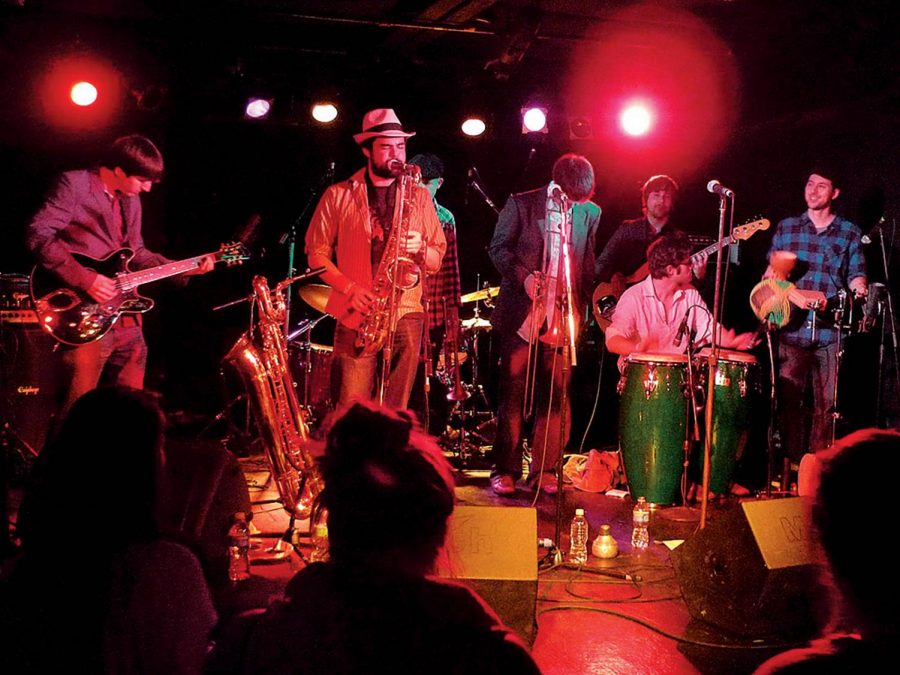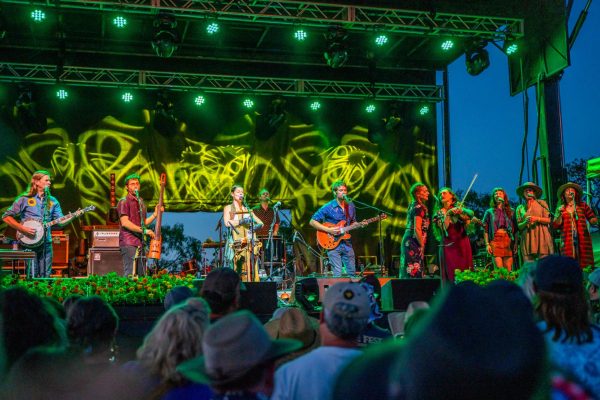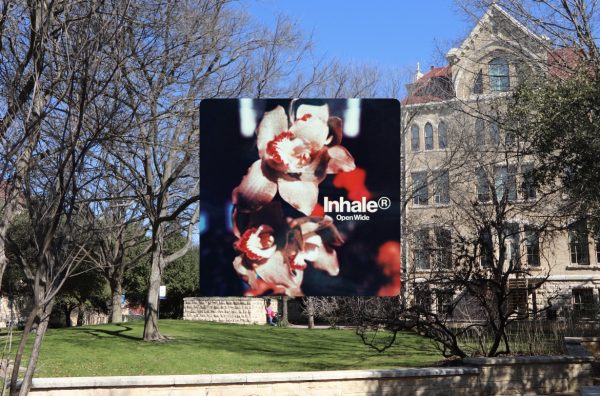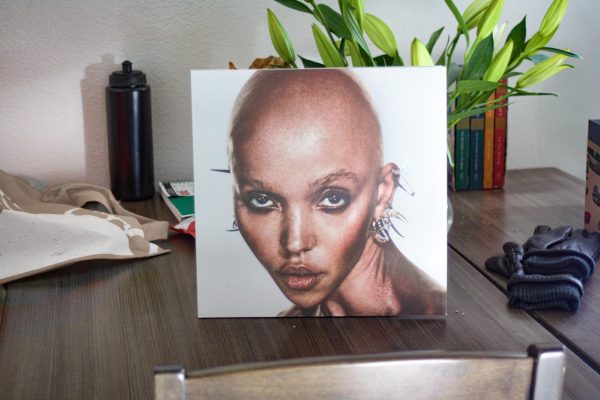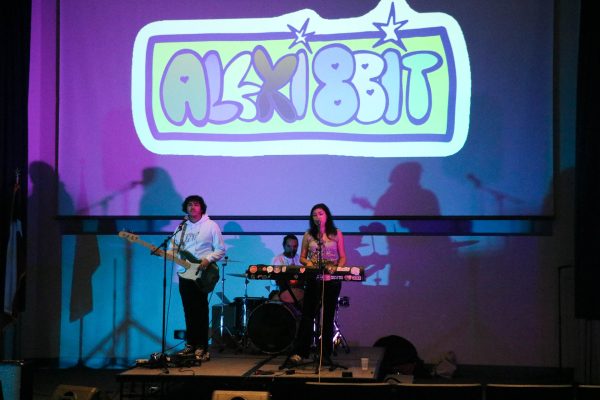New York instrumental band brings fresh sound, style to ACL Festival
Ikebe Shakedown is comprised of seven musicians that run their band democratically.
Since their 2008 formation in Brooklyn, New York, Ikebe Shakedown has worked to put a unique twist on afro-beat and psychedelic soul music, forming their own distinct and recognizable sound in the process. Each song, solely instrumental, tells a story, encouraging listeners to create their own meaning as they move to the rhythm.
During the second Saturday of Austin City Limits, Gianni Zorrilla and Joey Hadden sat down with Robin Schmidt, guitarist of the vibrant, vintage funk band. Just a few hours prior, they played a non-stop, energetic set at the Tito’s Handmade Vodka Tent stage.
Obviously you guys have been at this for a long time (over 10 years now), so how do you feel your music has evolved in that time period?
That’s a great question. We have been doing it for almost ten years now, basically with almost the exact same crew of people, which is sort of unusual with seven people. We run the band democratically too, so there’s no band leader or anything like that, and we have kind of evolved in our influences over the years. When we started out we were trying to do more afro-beat and more sort of straight ahead funk, and now we’ve tried to bring in more cinematic elements, more western stuff, more soul and our writing process changed too, so that really has changed things. Early on, it was like somebody would have a song, bring it in, and we’d all put our own spin on it, but it was very much like OK, this is this person’s tune, and now it’s much more of a group process.
We’re interested in hearing about the early days and formation of the band. We know you guys are from Brooklyn, so how do you feel the Brooklyn soul scene influenced your music? What about New York City is an inspirational force for you?
We actually started as a band before that in college. The bass player and drummer and I went to college together at Bard College, which is two hours north of New York City, which was awesome. We had a band there, which was a different sort of thing– we basically had a funk quartet with an organ player up there, and then when we moved down to the city, it was like somebody met somebody met somebody and we gradually added everybody. Obviously the Brooklyn soul scene was definitely a big influence on us as well. A lot of our influences are from the ‘60s and ‘70s, but you can’t deny that a lot of our influences are also from now, not only Brooklyn, but certainly there’s the Daptone scene and we recorded one of our albums at Daptone because we were loving that music. We draw from the California scene too and so many different people that we know that are contemporaries are also influences.
This ties into your interest in soulful and funky music. Where did that stem from? You did mention some of your influences, so I’m assuming that is a part of it.
Yeah, I mean obviously I’m sure it’s different for different people in the band. For me, I started liking that stuff in my early to mid teens. Just sort of hearing different artists that were doing that in the late ‘90s early 2000s, that dates me but you know, I think for all of us it was different. We each have different influences in that vein, but we all sort of love the same stuff… like the Meters are incredible, we have Booker T and the MGs, like we all love that stuff. We all love Chris Mayfield, Isaac Hayes, all this amazing ‘60s and ‘70s soul and funk. There’s a million different bands I can name, but there’s just so much awesome stuff from that era. That’s sort of where we’re coming from, and then we try to do something with it.
It’s hard to come by an instrumental band at ACL. You guys are definitely an outlier in that sense, which sets you apart. Do you think that there are other aspects of your band or you guys as musicians that set you apart from the other artists that are here this weekend?
Yeah, that’s a good question, too. That certainly is a thing, and it is unusual to see instrumental bands, and that’s sort of been what we’ve done, and we’ve thought about partnering with some singers. That may still happen but in general we’re an instrumental band. I think aside from that, we are bringing this combination of instrumental music, soul and sort of a cinematic vibe at the same time… trying to bring out all seven peoples’ influences together, and again us doing that as a unit of seven people is a unique thing. I think that a lot of bands that are of our size have somebody leading, but for us it’s not– we’re doing it all together.
Another thing that I think sets you apart from other guitarists here is that you have experience playing with a horn section. How do you think that has influenced your style and/or skills as a guitarist?
That’s also a really interesting question. I like that question. Yeah, it’s totally a different thing, right, and it’s not just necessarily horns versus rhythm section, but even just the size of the band. The more people you have, it’s cool you have so many different elements, but at the same time, you have more elements that you’re trying to work in between. So if you’re like a duo or trio, you can play a lot more, and you probably should play a lot more. If you’re playing in a smaller setting, you kind of have to pare it back a little and be like ‘OK, what fits in this space? Where is the space? How do I make that feel right?’ And that’s true definitely with a horn section. It’s like I’m not playing the melody; the horns are usually playing the melody, and I’m usually playing more of a rhythm part, but maybe there’s a part where I come forward with the melody and then they start playing more like chord voicings, or we trade off solos. There are so many different ways of doing that, but it is a different thing.
Ideally, how would you want your fans to interpret your music? Do you feel that each song tells a distinct story, or do you want them to infuse it with their own meaning?
This is also a good question. As an instrumental band, I think a lot of it is people forming their own meaning. Certainly we go into the writing process with intention as far as how we feel each section is coming across, and like the vibe, and you know, we try not to overthink it, but we also do think about those things. At the same time we know and we hope that people who hear it will form their own idea of what it means to them. Their own imagery will appear. That’s part of the cinematic experience that we hope that people will hear and form their own view of it.
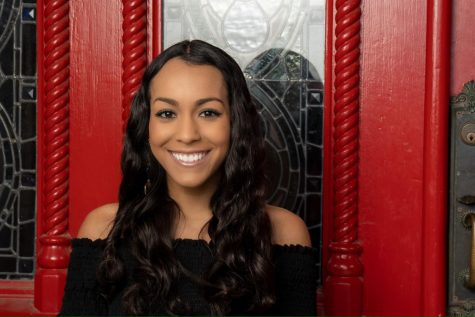
Hey everyone! My name is Gianni Zorrilla. I study communication and journalism and digital media here at St. Edward’s and am one of the Editors-in-Chief...


